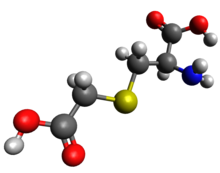Carbocisteine

| |

| |
| Names | |
|---|---|
| IUPAC name
(R)-2-Amino-3-(carboxymethylsulfanyl)propanoic acid
| |
| Other names
S-Carboxymethyl-L-cysteine; Mucodyne, Solmux, Rhinathiol, Humex, Lisomucil, Fluditec, Exputex, Mucolit, Reodyn, Carbotoux, Flemex, Carbolin, Muflex
| |
| Identifiers | |
3D model (JSmol)
|
|
| ChEBI | |
| ChEMBL | |
| ChemSpider | |
| DrugBank | |
| ECHA InfoCard | 100.010.298 |
| KEGG | |
PubChem CID
|
|
| UNII | |
CompTox Dashboard (EPA)
|
|
| |
| |
| Properties | |
| C5H9NO4S | |
| Molar mass | 179.19 g·mol−1 |
| Appearance | Colorless solid |
| Melting point | 204 to 207 °C (399 to 405 °F; 477 to 480 K) |
| Pharmacology | |
| R05CB03 (WHO) | |
Except where otherwise noted, data are given for materials in their standard state (at 25 °C [77 °F], 100 kPa).
| |
Carbocisteine (INN), also called carbocysteine (USAN), is a mucolytic that reduces the viscosity of sputum and so can be used to help relieve the symptoms of chronic obstructive pulmonary disorder (COPD) and bronchiectasis by allowing the sufferer to bring up sputum more easily.[1][2] Carbocisteine should not be used with antitussives (cough suppressants) or medicines that dry up bronchial secretions.
Carbocisteine is produced by alkylation of cysteine with chloroacetic acid.[3]
Trade names
- Bronles: Macedonia[4]
- Fluifort: Italy
- Carbex: Pakistan
- Mucospect: South Africa
- Exputex: Ireland
- Fluidol, Humotusin: Romania
- Rhinathiol: Bulgaria, Congo, Hong Kong, Hungary, Latvia, Lithuania, Malaysia, Oman, Romania, Singapore, South Korea, Switzerland, Taiwan, Thailand, Tunisia, and Vietnam[5]
- Mucodyne: United Kingdom, India, Ireland, Japan, Netherlands, Serbia.
- Mucoral: Portugal
- Mucosol: Egypt
- Solmux, Loviscol: Philippines
References
- ^ Zheng, J.P., Kang, J., Huang, S.G., Chen, P., Yao, W.Z., Yang, L., Bai, C.X., Wang, C.Z., Wang, C., Chen, B.Y. and Shi, Y. (2008)."Effect of carbocisteine on acute exacerbation of chronic obstructive pulmonary disease (PEACE Study): a randomised placebo-controlled study. The Lancet, 371(9629), 2013-2018.
- ^ Yasuda, H., Yamaya, M., Sasaki, T., Inoue, D., Nakayama, K., Tomita, N., Yoshida, M. and Sasaki, H., 2006. Carbocisteine reduces frequency of common colds and exacerbations in patients with chronic obstructive pulmonary disease. Journal of the American Geriatrics Society, 54(2), pp.378-380.
- ^ Karlheinz Drauz, Ian Grayson, Axel Kleemann, Hans-Peter Krimmer, Wolfgang Leuchtenberger, Christoph Weckbecker “Amino Acids” in Ullmann's Encyclopedia of Industrial Chemistry, 2007, Wiley-VCH, Weinheim. doi:10.1002/14356007.a02_057.pub2
- ^ "Bronles". alkaloid.com.mk.
- ^ "Rhinathiol". Drugs.com.
